Every culture has their version of a wedding ceremony, which, while deeply rooted in tradition, is usually mixed with modern trends, and may differ between sectors of society. This is exactly the case in Thailand.
In this article I aim to shed a little light on how a Thai wedding actually goes down. I've been through one myself, and have attended a handful too, so I have a pretty good grasp on the topic.
So, if you’re planning on marrying a Thai, or you’re just looking to broaden your worldly perspective, here’s how it’s done.
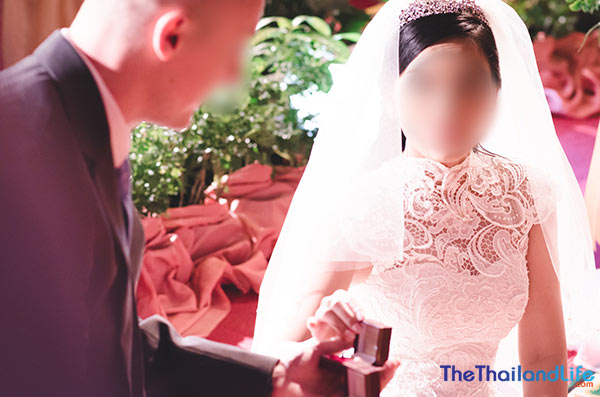
1. The Thai Marriage Proposal
Not so long ago it was common for Thais to arrange their children’s marriages. Even if a marriage wasn't arranged, it was, and still is, very important that the parents of the bride and groom be consulted before any arrangements are made.
These days arranged marriages aren't so common, but plenty of “introducing” still goes on, particularly in the upper echelons of society.
Historically, if the groom’s parents agreed with their son’s choice of wife, the son's parents would then ask the would-be bride’s parents if they agree to the marriage.
If the bride's parents agreed, the bride’s parents would then negotiate the ‘Sin Sod'. Westerners would call this a dowry.
The asking of the bride's parents is still commonplace today, and it is considered ill-mannered to not follow this tradition. The Sin Sod must be negotiated with the parents, not with the bride to be.
2. Choosing the Wedding Date
Thais believe that there are favourable dates and times for planning significant and important events.
An important monk with a knowledge of astrology is consulted to help decide what date would be best for the union to be blessed and for the marriage to be given the strongest footing from the outset.
3. Wedding Invitations
Since there are often multiple ceremonies involved with the Thai / Buddhist wedding, there may be a separate invite for each event. For example, there is usually a separate engagement ceremony, but it's commonplace for this to happen on the same day as the wedding.
More often than not, one invitation will suffice, unless you are planning to invite different to different aspects of the wedding.
Traditionally, the invitation is hand delivered by a member of the adjoining families.
4. Making Merit and Honouring the Bride’s Ancestors
Most often, before any important event or holiday, a Buddhist will “make merit” to summon good things into one’s life.
There are numerous ways to “make merit” such as donating money to a temple. In the case of a wedding, the family will invite monks to bless the bride and groom as well as their home and pay respects to their ancestors.
The monks will chant and offer life advice, and in return the family will feed them before sending them on their way.
This ceremony may be treated as a separate event entirely, so it could happen days before the actual wedding takes place. However, it is common for this ceremony to take place on the day of the wedding, particularly if the marriage is happening at home.
If the merit ceremony happens on a different day than the wedding, the couple are still likely to wake early in the morning to meet a monk for a quick blessing.
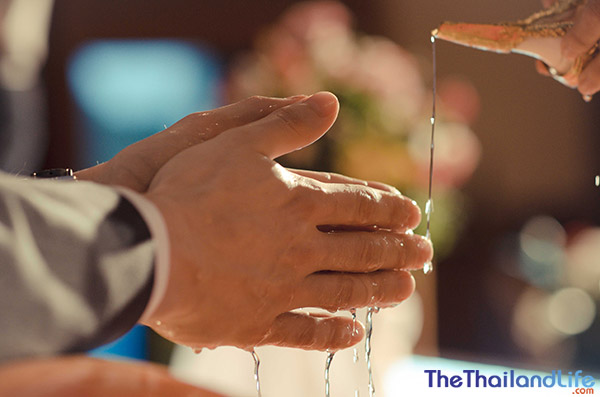
5. The Thai Wedding Dress
Though it has become common for modern couples to wear the typical western style of white dress (woman) and suit (man), the Thai classic attire is still widely used.
The traditional bridal dress does vary, with about six different styles to choose from. The men will usually wear the Thai traditional pants, but may switch out the traditional Thai top in favour of a more Western flavour.
As you can see in my wedding pictures, We are wearing Western influenced dress. My wife wanted a “proper” wedding dress and not the old school Thai style. I was more than happy to wear a suit over the traditional Thai clobber.
We also held our wedding in a hotel, as opposed to the family home.
6. Bridesmaids and Groomsmen
As with wedding parties all over the world, the bride and groom will choose a number of Bridesmaids and Groomsmen to aid them in organizing the wedding and helping on the day. However, in Thailand it is rare to see a best man or matron of honour.
Duties aren't specific and will very depending on the needs of the couple.
7. The Thai Engagement Ceremony (Khan Maak Procession)
Having reached an agreement for the Sin Sod (dowry) (actually this is done long before the wedding day but is acted out on the day) , the groom can now go to claim his bride – sounds primal!
In past times, the groom would travel on foot from his home to his bride’s home, accompanied by a procession of his family, friends, and other well-wishers.
The groom’s paraders would carry offerings for the bride’s family. On their way, they would sing songs and play instruments such as traditional Thai long drums, and basically have a traveling party. The offerings they carry all have specific meanings.
For Thais, it is quite common nowadays for the engagement to take place on the same day as the wedding.
In many Thai-foreigner relationships the engagement often follows the western tradition of being a romantic one-on-one occasion that is then announced to others afterwards. My wife and I had an informal engagement, not a traditional one.
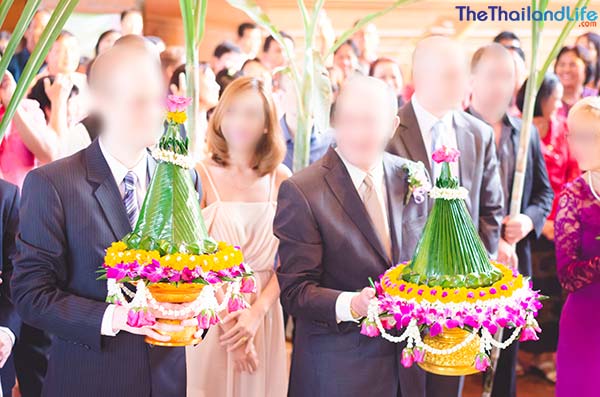
The procession was held in the hotel and we walked to the wedding hall. The lobby was fairly big so it felt quite authentic.
Gold (and or coins), flowers and the leaves and nuts of a young Betel plant are arranged on the Kan Maak tray. The meanings of the items range from health and prosperity to fertility and long life.
Additionally, the traveling guests will also carry various foods such as fruits and desserts.
In modern times, the procession is likely to just start down the street and end at the wedding venue, which will be a house or, more frequently these days, a hotel.
8. The Groom's Gated Approach
When the groom finally makes it to his destination, he still has another challenge to face. His way will be blocked by a series of gates held up by the bridesmaids and various family members. The gates are made from a necklace or a belt made of gold (probably not real, depending on the wealth of the couple).
Some of these gates can be passed simply by a payout of money, whereas others will ask the groom to answer questions. The groom may even be required to perform a task such as shouting out a confession of love, or singing a song.
I just opted for money in envelopes.
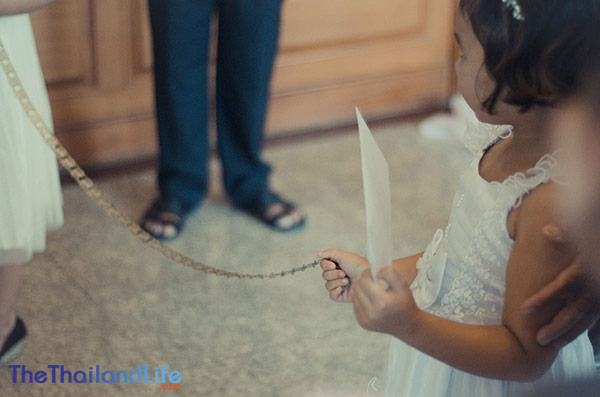
Children from the immediate family manned the gates. I gave each person an envelope with a small monetary gift inside so that I could pass through.
9. Retrieving the Bride
After satisfying all his tasks, the groom may now enter to find his bride. Commonly, the bride will be waiting in a room separated from the guests. When the groom is waiting inside, the bride’s parents will bring out their daughter from behind closed doors and present her to the husband to be.
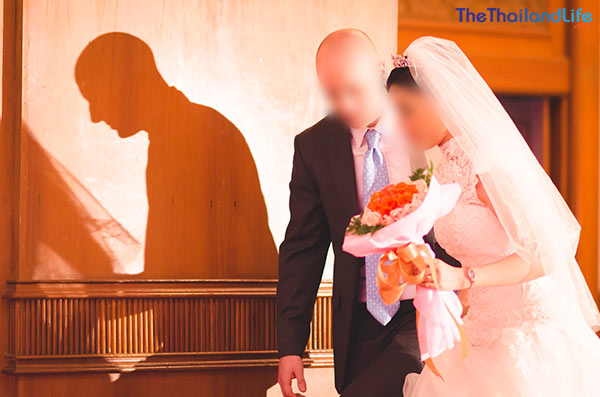
My wife to be waited in a separate room for me to collect her and bring her to the wedding stage. This was the most emotional part of the wedding for me. My wife looked stunning.
10. Presenting The Sin Sod (Dowry)
Having retrieved his bride. It is now time to present the bride’s parents with the Sin sod. A tray/decorated bowl, upon which the gifts and money rest, is offered to the parents. After the gifts are accepted, the items are wrapped in silk and handed to the mother of the bride.
As tradition dictates, and to display how generous the groom is, the bride’s mother will make a show of carrying the offering as if it’s extremely heavy.
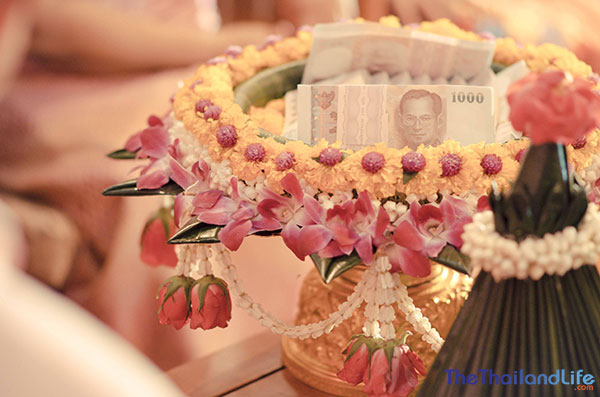
Our Sin Sod presented in a decorative bowl. There was also two items of gold jewellery.
11. Sai Monkhon (Joining by Thread)
We now arrive at the most heartfelt aspect of the wedding ceremony, the Sai Monkhon.
The bride and groom must sit or kneel next to each other. Their arms will rest on a small padded table and their hands must be held together in prayer position.
An elder member of the family – who is considered to have a successful marriage – will place the traditional headpiece called Mong Kol on the head of both the bride and groom.
This string headpiece, previously blessed by monks, must be made out of one piece of cotton. This will join the couple in ceremony, and symbolically for the rest of their lives.
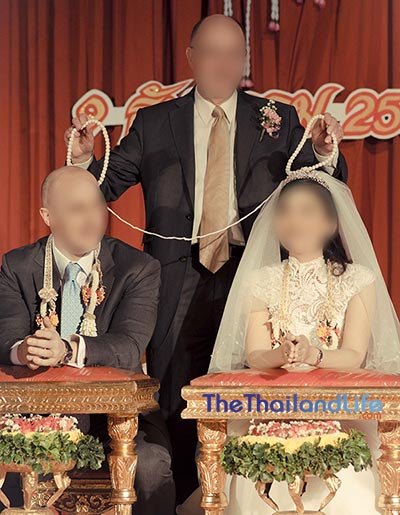
The Sai Monkhon: We are joined by a thread by my father.
12. Rod Nam Sang (Shell Ceremony)
With the bride and groom seated next to each other (bride on the left,) and joined by the Sai Monkhon thread, the guests will begin to line up to have a turn blessing the couple.
The couple hold their hands together, as their most honoured guests use a special shell, usually taken from the sea, to pour water over the uniting pair.
As a person pours on the water, it is customary to wish the couple well and offer advice on having a good life together.
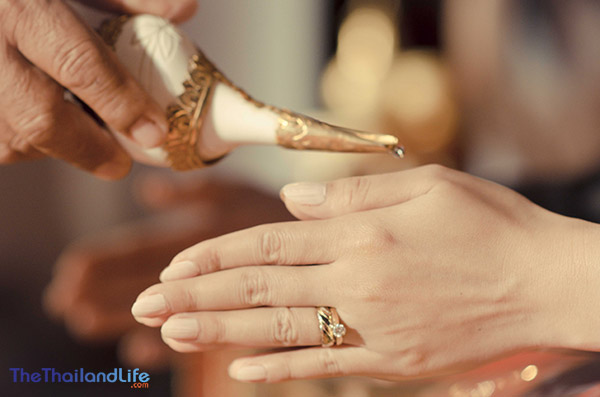
My wife having water poured on here hands during the Rod Nam Sang.
13. The Thai Wedding Reception
After all of the guests have had a chance to pour the water and wish the couple well, the couple will invite them to eat and mingle.
This part of the ceremony can range from a simple gathering at a table to a full on party with dancing and games.
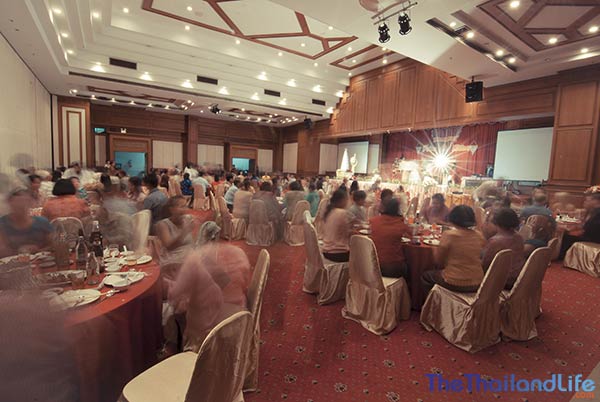
Our reception, where everyone enjoyed food and drink.
It is in this part of the ceremony that you may find a more western influence, but the Thai still have their own ways of doing things.
Usually, one or two friends of the bride and groom will be chosen as the master of ceremonies for the evening. It is the MC’s job to introduce the newlyweds and host any games.
Family members and friends are invited up to speak about the bride and/or groom. The couple may even have to take part in a game show style quiz.
As is done in western weddings, you may also see a cutting of the cake and a throwing of the bouquet.
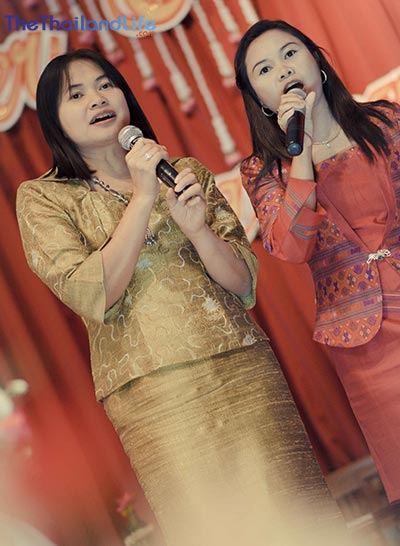
Of course there had to be some karaoke!
14. Preparing the Bridal Bed
Perhaps the final thing to happen on the wedding day will happen in the bedroom, but it’s not quite what you may think.
The bride and groom will be escorted to the bedroom, where an older married couple will present them with an array of items that demonstrate the path to a successful marriage.
The bed will likely be covered in flower petals, as well as a brass tray of traditional symbols.
The most common items on the tray include a bag of beans or seeds to show prosperity, a bowl of water to symbolise harmony, a mortar to represent solid love, an unripe squash to bring a happy marriage, the figure of a sleeping cat to show comfort at home, a symbol of a rooster to promote waking up early, and finally a cane as a symbol of long life.
Tradition says the couple should sleep with these items in the bed for three days, though that rarely happens anymore.
On most occasions, it will be the parents that prepare the bed and explain the symbols, and once they’ve completed the lessons, they will leave the newly married couple alone in the bed to show the desire for children.
This part of the ceremony is pretty rare these days and wasn't part of our Thai wedding. Instead, we had some drinks around the pool with friends.
Thai Weddings In the Modern World
I hope you now have a better understanding of the traditional Thai wedding ceremony.
Please note that this is just an overview of a the most common and recognisable practices. You may come across other traditions not mentioned here, and traditions can be specific to a region.
For example, the northern and southern parts of the country may differ in their approach. You can also expect differences among the ethnic Thai-Chinese community, not to mention all the modern “fairytale wedding” elements thrown in the mix too.
While most foreigners marrying in Thailand will experience many of the same traditions listed in this post, tailored weddings that represent both the bride and groom’s cultures are becoming increasingly common.
As a couple, you should feel free to assert your own creative vision for your special day. And while your adopted Thai family may expect certain elements to remain the same, most families will be very open to including your culture too.
I wish you all the best with your Thai wedding!
—–
If you are from the UK and plan on taking your wife back home for a visit, you'll need to obtain a visit visa. You'd think it would be easier now that you're married, but in reality the process is no different, married or not.
I have a guide that will save you a lot of time and money. It has been used by hundreds of my readers. Click here to read more.
One Last Thing!
If you're planning on having your wedding in Thailand, then you'll want everything to go as smoothly as possible for the big day.
I can't stress how important it is to make sure you have top notch travel insurance.
Every week there are stories in the news here about foreigners who've had accidents or lost belongings and have no coverage to pay the medical bill or cover their lost items.
Who knows, you might miss your flight, but if you have the right travel insurance, you'll be covered.
The likelihood is nothing will happen. But it's sod's law that if you aren't covered it will.
Click here to read up on the two companies I recommend.
More Tips for Married Life
Improve Your Thai Skills:
Learning Thai makes life here easier and more fun. I use Thaipod101. It is free to get started & easy to use.
Send Money to Thailand:
Use Wise. It is fast, cheap, and gives you the market exchange rate. Me and the majority of my readers are using it.
Get Help with Pension or Investment Planning
Connect with my trusted, personal Independent Financial Advisor using this form
Last Updated on


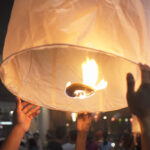
Adam Taylor says
With regard to the "informal engagement", does this refer to having it on the same day of the wedding ceremony? Or an adaption of the same day engagement ceremony?
We are planning our wedding based on a blend of Thai/Western. So I did considering removing the engagement ceremony as we're already engaged.
However, considering my future wife is Thai, I'm assuming this would not be a good idea culturally. Plus it would affect the flow of the wedding process.
Noting we are both without parents and she is not traditional / conservative.
Your thoughts?
Nov 06, 2017 at 11:14 pm
TheThailandLife says
Nov 07, 2017 at 6:27 pm
Thai Tastic says
Sep 07, 2017 at 10:42 pm
Geoff says
Is a dowry still expected and if so how much, in what form (gold/cash) and who would receive it?
Jul 20, 2017 at 3:13 am
TheThailandLife says
Jul 20, 2017 at 3:58 am
David says
May 20, 2017 at 8:16 am
Denise Ward says
Apr 11, 2017 at 3:07 am
TheThailandLife says
Apr 11, 2017 at 3:47 pm
Zoli says
Jan 03, 2018 at 6:31 am
TheThailandLife says
Jan 03, 2018 at 4:27 pm
wordi says
As I have said before, at some point you have to ask yourself if the family treat you like this on day one, is this really the kind of family you want to be part of?
In my case, I will agree to no more than 200,000. 100K to be returned after the ceremony and I will pay that a couple of years later, when I am certain about everything. Any family not accepting this, is not showing consideration foreign man's side of the cultural exchange. It is a compromise, but he is the only one expected to take financial risk.
Apr 29, 2017 at 11:35 pm
Michael Y. says
just reading about the dowry comments, yes for westerners the paying to marry does seem strange , but I think you need to see there side , there custom.
I am getting married in late May this year, the monks picked the date. as I read month and is very important to thais.
My wife to be is very educated been to university, has a good government job , unmarried and of cause a lovely beautiful person. Back to dowry I have agreed on a lot more than what I have read, I am an average joe.. so not rich.
But as I said .a different custom , I have been told a little more because of the cost of her education and her position now. so my dowry is 1 million baht.
YES.. a lot.. but if you believe she is the one and genuine....than WHY NOT
So yes the fee is a sticking point.. is not just a money grab
OH my brother has a thai wife , happily married about 6 years now , and roughly the same thing. Okay just my thoughts.
Feb 25, 2017 at 8:27 am
Adam West says
It always seems a bit one sided when dealing with Thais in just about everything from a European point of view. It's always their customs which have precedence etc..... I think it is just the foolish European outlook in that we are more adventurous and not concerned with saving face etc.... Just something to think about.
Feb 25, 2017 at 7:37 pm
Michael Y says
I hear some thais ( males ) have payed that or more for the dowry , a rare thing I guess considering the real dollar value.... We are to be married in Kalasin at her parents home, small traditional style
Dowry is a big talking point......Thanks for the input .. Mike (aussie)
Feb 27, 2017 at 9:17 am
david mills says
yes there are some manupulitive women who take advantage, also some that do not wish to take dowry. It also depends on the family status.
Is it really much different to buying engagement rings ad wedding rings and paying for wedding in the west?
In my example I have been with my Thai Partner in UK for 5 years. She has worked hard in Uk for 14 years and paid for house for her mom.
She bought land for her also.
Her stepdad died earlier this year and we marry next year.
Had we planned to stay in UK we would not have married.
She did not want a big ceremony as she did not want to "spend" lots of my money.
It was me that suggested the Thai Budhist ceremony.
I am paying dowry of 100 000 baht as her mom is not wealthy and the money will be used to buy equipment to work the farm and some already used for the funeral ceremony.
In the west and Thailand you can get good or bad, no stereotyping.
Oct 19, 2017 at 4:40 am
TheThailandLife says
Oct 20, 2017 at 9:36 pm
Martin1 says
Was it what the parents (mother) of the bride said first, and you accepted?
Keep in mind that negating is a big part of Thai culture.
Ma wife has a Master degree and also works for the government. Her mother wanted 1,5 Million Baht from me!
After negotiating I paid 500K plus gold to them with 100K payback to my wife, and the parents took completely care of the wedding.
For me that sounded fair.
Keep in mind in matters of sin sod that a poor farmer's daughter can expect no more than 80 - 100 K (plus gold), and sin sod in the 6 figures is usual only when marrying upper class woman like show stars or daughters of some high government official, or rich factory owner.
May 02, 2017 at 1:35 am
Adam West says
Feb 06, 2017 at 7:27 pm
Ray says
Jan 11, 2017 at 6:20 am
TheThailandLife says
Jan 11, 2017 at 5:10 pm
Martin1 says
Thai people would not pay sin sod for a divorced Thai woman - if they married her at all.
You can do of cause. Maybe you ask their parents, and hear what they say as first offer.
Personally I would not pay more than 100K THB for a divorced (or widowed) Thai lady.
May 02, 2017 at 1:40 am
Mike says
From what I have read all that you have mention are negatives for the Sin Sod. The age, divorce and kids. I'd probably shoot for 100-150K. However if you love her and she is right for you you don't want to seem cheap or ungrateful. Remember, as mentioned this is just for family face. The money is either returned or not used for its intended purpose anyway.
May 27, 2017 at 1:37 pm
Gilbert Alsop says
One question: when guests give the money in the envelopes. Who is it for? Is it for the couple to build their life together or for the Thai side of the family (in this case the bride in a farang/Thai marriage) to pay for their share of the wedding costs? Are the guests simply 'paying their way'?
Apr 10, 2023 at 8:39 pm
TheThailandLife says
Apr 11, 2023 at 4:20 am
Harry says
Dec 17, 2016 at 12:54 am
TheThailandLife says
Dec 17, 2016 at 3:46 am
Adam West says
Feb 06, 2017 at 7:34 pm
Julie Rees says
Oct 28, 2016 at 2:47 am
TheThailandLife says
Oct 28, 2016 at 10:07 pm
Setonix says
Mar 12, 2017 at 2:02 pm